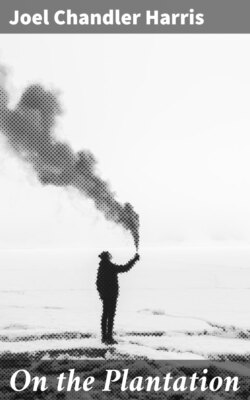Читать книгу On the Plantation - Joel Chandler Harris - Страница 8
На сайте Литреса книга снята с продажи.
Оглавление
When tired of the stage he would clear his throat and render some of the old ballads, which he sang very sweetly indeed.
One night, after the little domestic concert was over and Joe was reading a book by the light of the pine-knot fire, a great fuss was heard in the hen-house, which was some distance from the dwelling.
“Run, John,” exclaimed Mrs. Snelson; “I just know somebody is stealing my dominicker hen and her chickens. Run!”
“Let the lad go,” said Mr. Snelson, amiably. “He’s young and nimble, and whoever’s there he’ll catch ’em.—Run, lad! and if ye need help, lift your voice and I’ll be wit’ ye directly.”
The dwelling occupied by Mr. Snelson was in the middle of a thick wood, and at night, when there was no moon, it was very dark out of doors; but Joe Maxwell was not afraid of the dark. He leaped from the door and had reached the hen-house before the chickens ceased cackling and fluttering. It was too dark to see anything, but Joe, in groping his way around, laid his hand on Somebody.
His sensations would be hard to describe. His heart seemed to jump into his mouth, and he felt a thrill run over him from head to foot. It was not fear, for he did not turn and flee. He placed his hand again on the Somebody and asked:
“Who are you?”
Whatever it was trembled most violently and the reply came in a weak, shaking voice and in the shape of another question:
“Is dis de little marster what come fum town ter work in de paper office?”
“Yes; who are you, and what are you doing here?”
“I’m name Mink, suh, an’ I b’longs to Marse Tom Gaither. I bin run’d away an’ I got dat hongry dat it look like I bleedz ter ketch me a chicken. I bin mighty nigh famished, suh. I wish you’d please, suh, excusen me dis time.”
“Why didn’t you break and run when you heard me coming?” asked Joe, who was disposed to take a practical view of the matter.
“You wuz dat light-footed, suh, dat I ain’t hear you, an’ sides dat, I got my han’ kotch in dish yer crack, an’ you wuz right on top er me ’fo’ I kin work it out.”
“Why don’t you stay at home?” asked Joe.
“Dey don’t treat me right, suh,” said the negro, simply. The very tone of his voice was more convincing than any argument could have been.
“Can you get your hand out of the crack?” asked Joe.
“Lord, yes, suh; I’d’a done got it out fo’ now, but when you lipt on me so quick all my senses wuz skeered out’n me.”
“Well,” said Joe, “get your hand out and stay here till I come back, and I’ll fetch you something to eat.”
“You ain’t foolin’ me, is you, little marster?”
“Do I look like I’d fool you?” said Joe, scornfully.
“I can’t see you plain, suh,” said the negro, drawing a long breath, “but you don’t talk like it.”
“Well, get your hand loose and wait.”
As Joe turned to go to the house, he saw Mr. Snelson standing in the door.
“It’s all right, sir,” the youngster said. “None of the chickens are gone.”
“A great deal of fuss and no feathers,” said Mr. Snelson. “I doubt but it was a mink.”
“Yes,” said Joe, laughing. “It must have been a Mink, and I’m going to set a bait for him.”
“In all this dark?” asked the printer. “Why, I could stand in the door and crush it wit’ me teeth.”
“Why, yes,” replied Joe. “I’ll take some biscuit and a piece of corn bread, and scatter them around the hen-house, and if the mink comes back he’ll get the bread and leave the chickens alone.”
“Capital!” exclaimed Mr. Snelson, slapping Joe on the back. “I says to mother here, says I, ‘As sure as you’re born to die, old woman, that B’y has got the stuff in ’im that they make men out of.’ I said them very words. Now didn’t I, mother?”
Joe got three biscuits and a pone of cornbread and carried them to Mink. The negro had freed his hand, and he loomed up in the darkness as tall as a giant.
“Why, you seem to be as big as a horse,” said Joe.
“Thanky, little marster, thanky. Yes, suh, I’m a mighty stout nigger, an’ ef marster would des make dat overseer lemme ’lone I’d do some mighty good work, an’ I’d a heap druther do it dan ter be hidin’ out in de swamp dis away like some wil’ varmint. Good-night, little marster.”
